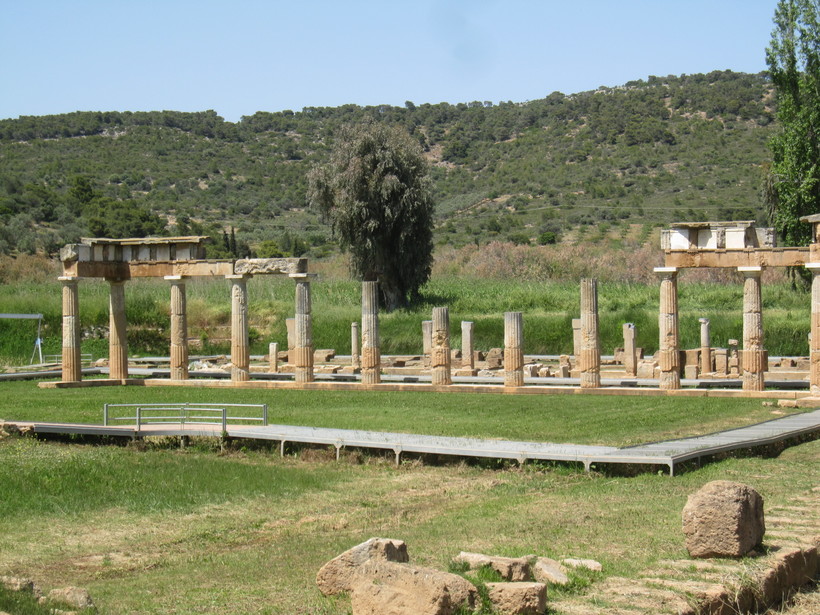By:
I am Greek and I love Greece. In contrast to Socrates who said I know that I know nothing, I say I know a few things about the world and Greece in particular.
The world is a big place, so my knowledge is very limited. I traveled to Latin America, Africa and Asia, but my travels were brief. Colombia, Mexico and Brazil opened my eyes to exploitation, the crimes foreign governments and corporations and local rich people and governments commit against peasants: stealing their land or forcing them to abandon their agrarian traditions for a compromised, armed-to-the-teeth farming.
My knowledge is slightly more detailed for the United States where I have been living since 1961. I went to college in America and that education and experience shaped my character. But it is my Greek traditions, both those I inherited from my father and those more substantial that I inherited from reading the texts of ancient Greeks, which guide my life.
I wear my Greek culture all over me. This is not bragging but a statement of fact: Greek culture is our greatest virtue and possession. It protects me from the radiation of the modern, the hubris of the scientist saying the moderns invented science or that nuclear weapons, factory farming, polluting technologies, and neurotoxins serve a purpose other than make money for their unethical owners. They are the modern equivalent of dark-age privileges of landlords.
When I visit Greece, I speak only Greek. I try to see the world like the people living in Greece. But that’s easier said than done.
Greeks face realities alien to me. Their Christian metaphysics all but swallows Aristotle and other great Greek thinkers. The extraordinary legacy of the ancient Greeks in architecture, theater, literature, science, politics, and technology remain vague pies in the sky; they rarely inspire the remaking of Greece in its original model.
Second, and no less crucial, is the oppressive economic dependence of the Greeks on foreigners because of the huge amounts of money their governments borrowed. This “debt” has become an inferno consuming the Greeks – muddling their sense of patriotism, pride, hospitality and justice.
Who is to blame for this catastrophe? Should they exile their politicians and bankers? Or, perhaps, they need to reform and become another Germany or Ireland? No one has answers to these questions. The antagonistic Greek party system makes certain of that.
During my latest Greek journey, in April-May 2017, I did the usual: I stayed with my sisters, listening to them and learning something new of family history.
I also gave several lectures. High school students in Cephalonia loved my presentations on the marvel of ancient Greek civilization known as the Antikythera Mechanism: a modern-like metal astronomical computer that united the heavens and Earth.
Elementary school pupils and their parents thanked me for throwing light on the metamorphosis of farming into a Lernaia Hydra-like beast devouring the natural world and sprinkling our food with toxins.
I was fortunate in meeting Neni Nicolopoulou-Stamati, professor of environmental pathology at the Medical School of the University of Athens. She invited Angelika Hilbeck, professor at the Swiss Federal Institute of Technology, and me to address public health and agriculture. Angelika spoke about genetically engineered food and I reported on the abuses of factory farming, especially the toxic effects of pesticides. Angelika spoke in English and I spoke in Greek. We talked at the University of Athens and the Byzantine Museum.
First we stopped at a hot house growing cucumbers. The facility was bristling with high tech accessories. The manager, Aristotle Skentos, a tall young man, had also studied agronomy. He admitted he used pesticides but, as he put it, “very sparingly and for emergencies.”
Our second visit was with Miranda Chassioti, a young Greek woman with impressive education in France on museum management. Yet Miranda has been practicing organic farming in a grove of old fig trees and a vineyard in beautiful Porto Rafti (the harbor of the tailor). Miranda has been experimenting for two years in seeking an attractive way to convert her figs to marmalade. She is not alone. Gregoria said there are about 65,000 Greeks working in biological agriculture.
Finally, Gregoria and I paid our respects to Artemis of Brauron, a village since Neolithic times — and now in the neighborhood of Miranda. This is where Orestes and his sister Iphigenia sought refuge after Orestes murdered his mother Clytaemnestra in Mycenae. Iphigenia became a priestess of Artemis.
Artemis, sister of Apollo, was the goddess of wild life and the environment. Artemis Brauronia was dedicated primarily to women. During the annual celebration, Athenians sent their little girls to perform a bear dance for Artemis.
The ruins of the temple, the restored columns of the temple, and the museum occupy an idyllic niche of the natural world. Trees, bushes, birds, wild flowers and flowing groundwater give the archaeological site an exquisite appearance. I thought the goddess was watching.
Now this is the meaning of Greece. It’s as close to the gods and the sacred natural world as you will ever get. Like Brauron, the ruins of the temples of the gods are everywhere in Greece.
Greece is not merely a place for the leisure of tourists or for Greeks reluctantly returning to real agriculture while struggling in paying off their onerous debt. No, Greece is much more than that.
Greece is for the enlightenment and protection of our troubled world. Its myths inspire us with the courage and virtues of the heroic age when the natural world was sacred. Its science explores the origins of the cosmos and shows the way to truth. Its civilization gives us models for beauty and goodness: how people can live well together in a livable world.







